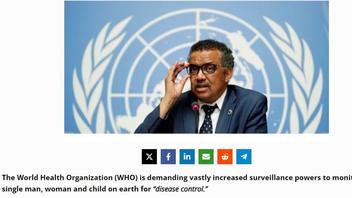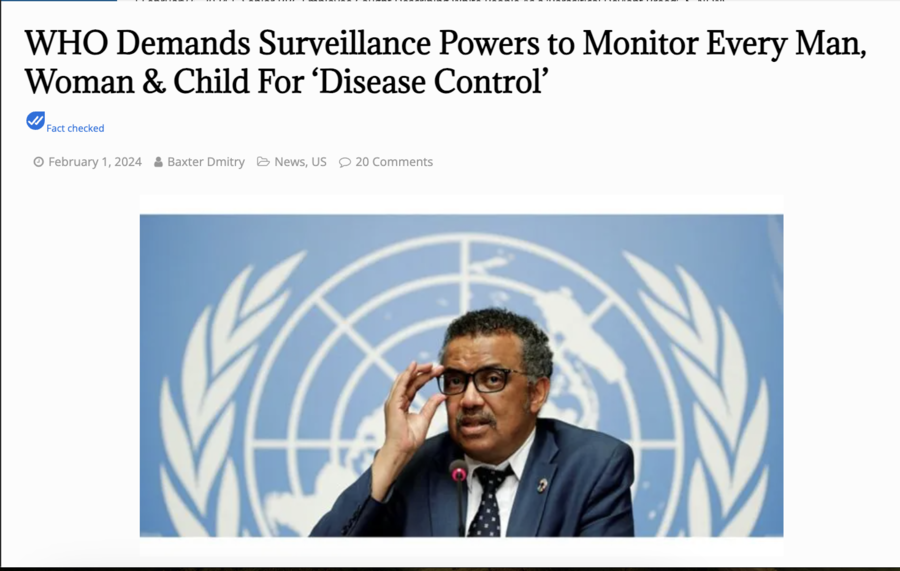
Did the World Health Organization seek "surveillance powers to monitor every man, woman, and child for 'disease control'" as a post on Instagram implied? No, that's not true: The post in question referred to a set of WHO recommendations that WHO member countries expand pathogen tracking and vaccine development in advance of potential pandemics. There is no call to surveil individual people, a legal expert told Lead Stories. The WHO recommendations addressed concerns related to personal security and confidentiality, and member nations may willingly choose to adopt these recommendations in accordance with their laws, WHO confirmed to Lead Stories.
The claim originated in an article published by The People's Voice on February 1, 2024 (archived here), titled, "WHO Demands Surveillance Powers to Monitor Every Man, Woman & Child For 'Disease Control.'" It opened:
The World Health Organization (WHO) is demanding vastly increased surveillance powers to monitor every single man, woman and child on earth for 'disease control.'
Below is how the post appeared at the time of writing:
(Source: The People's Voice screenshot taken Tues Feb 5 19:40:01 UTC 2024)
The article above refers to recommendations put forth by WHO to expand upon previously established health surveillance programs, such as disease tracking and vaccine development, not to surveil individual people. "Disease surveillance" is a public health term that doesn't mean the same thing as the similar term does in police work and national security. The WHO recommendation includes a clause that prioritized personal confidentiality and security.
Many nations currently have similar, less robust monitoring programs in place under the International Health Regulations, an international legal expert told Lead Stories.
The post's description of the WHO proposal as "demands" mischaracterizes the relationship of WHO to member countries. WHO experts develop recommendations but implementation is done by member countries if they adopt WHO's proposal, the United Nations agency confirmed to Lead Stories. The U.S. has previously expressed it would not agree to any program that infringed on national sovereignty.
The WHO proposals had not been approved as of February 6, 2024.
Known by several names -- including the "pandemic accord" and "zero draft" policy -- the WHO's set of proposals aims to curb the effects of potential future pandemics by expanding the already existing International Health Regulations (archived here).
First proposed in February 2023 (archived here), the most recent iteration of the proposal (archived here) was published on October 30, 2024. Outlined on page eight is Article 4, titled "Pandemic prevention and public health surveillance."
It calls for strengthened cooperation among member states, smoother data-sharing, strengthening and maintenance of public health laboratory and diagnostic capacities, as well as a periodic review of pandemic prevention, among other things.
The U.S. Department of Health and Human Services addressed concerns of sovereignty, writing on March 8, 2023, (archived here):
While the United States is deeply committed to a process that should result in shared commitments and shared responsibilities among nations, we are also aware of concerns by some that these negotiations could result in diminished U.S. sovereignty. The United States will not support any measure at the World Health Organization, including in these negotiations, that in any way undermines our sovereignty or security.
Similarly, members of the Intergovernmental Negotiation Body Bureau wrote in an October 14, 2023, Lancet article (archived here) that the plan was, at the time, in line with "full adherence to the principles of sovereignty."
Draft policy extends previous international measures
Eric Friedman (archived here), a lawyer and global health justice scholar at the O'Neill Institute for National and Global Health Law at Georgetown University, told Lead Stories in a phone interview on February 6, 2024, that member nations already have surveillance programs in place.
"These measures are strengthening every country's already existing surveillance programs," Friedman told Lead Stories. "It's one more step to making public health surveillance work better."
Such programs will not spy on individual people, but rather catch broader trends and potential disease spillover from animals, wastewater or insects, for example.
"If you get ahead of [an outbreak], then if [a disease] does cross the line into people, we already have a sense of what this virus is," Friedman explained. "It's very important to know what's out there in the environments."
The new framework would build more capacity for disease detection and preventative measures between agreeing nations, Friedman wrote in a briefing document (archived here).
Plan addresses privacy, security, confidentiality priorities
Specifically addressed in the most current 30-page document are priorities that address confidentiality and data protection. The following clause is on page eight:
12. Privacy, data protection and confidentiality - Implementation of this Agreement shall respect the right to privacy, including as such right is established under international law, and shall be consistent with each Party's national laws and international obligations regarding confidentiality, privacy and data protection, as applicable.
It's choice of member nations to adopt recommendations
The plan will not create an international, intergovernmental surveillance plan to monitor people, WHO spokesperson Karik Jašarević confirmed to Lead Stories in an email received on February 6, 2024.
"Countries take all decisions on health measures implemented for their populations, and have as part of the pandemic accord process stressed the principle that countries will, as always, be in charge of all health decision-making and not cede any sovereignty to WHO," wrote Jašarević, adding that:
WHO makes recommendations on a range of public health measures to contain the spread of diseases, and has stated this in relation to lockdowns. It is governments who make such decisions.
While agreeing parties may adopt such recommendations, WHO cannot force any nation to implement them, according to WHO:
As with all international instruments, governments themselves will determine actions under the accord while considering their own national laws and regulations.
It is expected that the policy may be adopted at the May 2024 World Health Assembly.
The People's Voice
The People's Voice has a lengthy record of publishing false stories in the past. It describes itself as a resource "comprised of various web pages operated by Fact Checked Limited," but it has nothing to do with fact-checking.
As of this writing, its website contains a liability disclaimer (archived here), saying:
FACT CHECKED LIMITED AND/OR ITS SUPPLIERS MAKE NO REPRESENTATIONS ABOUT THE SUITABILITY, RELIABILITY, AVAILABILITY, TIMELINESS, AND ACCURACY OF THE INFORMATION, SOFTWARE, PRODUCTS, SERVICES AND RELATED GRAPHICS CONTAINED ON THE SITE FOR ANY PURPOSE. TO THE MAXIMUM EXTENT PERMITTED BY APPLICABLE LAW, ALL SUCH INFORMATION, SOFTWARE, PRODUCTS, SERVICES AND RELATED GRAPHICS ARE PROVIDED 'AS IS' WITHOUT WARRANTY OR CONDITION OF ANY KIND.
Other Lead Stories articles on the WHO are here.













